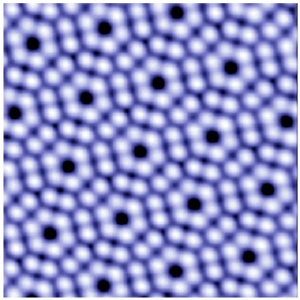Jul 6 2009
The London Centre for Nanotechnology researches spintronics and quantum computing: two of the most promising ways to scale computers down to ever smaller sizes. Microelectronics should already be renamed nanoelectronics since computer chips are now built on nanoscopic scales. Quantum computing could take this further by using single atoms to store and manipulate information.
 Si(111) 7x7 surface reconstruction using LCN’s STM - empty state
Si(111) 7x7 surface reconstruction using LCN’s STM - empty state
The London Centre for Nanotechnology is a UK-based, multidisciplinary research centre forming the bridge between the physical and biomedical sciences. It was conceived from the outset with a management structure allowing for a clear focus on scientific excellence, exploitation and commercialisation. It brings together two world leaders in nanotechnology, namely University College London and Imperial College London, in a unique operating model that accesses the combined skills of multiple departments, including medicine, chemistry, physics, electrical and electronic engineering, biochemical engineering, materials and earth sciences, and two leading technology transfer offices.
By the year 2020, the computer industry would like to sell machines that use just a single electron to store each bit of information. Working on such a small scale creates big problems, but “quantum computing” offers a revolutionary way to turn some of these problems into advantages. The race is now on to build such a device and many exotic quantum experiments are being considered. However, the solution may lie in a more familiar material: silicon. This prospect is exciting for the modern computing industry as silicon is already the basis for computer chips.
Dr Gavin Morley is at the heart of this research at the London Centre for Nanotechnology (LCN) and has been awarded the prestigious 1851 Fellowship by the Royal Commission for the Exhibition of 1851. The scheme of 1851 Research Fellowships is intended to give a few PhD level scientists or engineers of outstanding promise the opportunity for conducting research for a further period. Previously for two years, these fellowships from 2009 will be awarded for three years, providing an exceptional opportunity for PhD graduates to pursue further research at the highest level. Approximately eight awards are made each year.
Dr Gavin Morley studies electrons that can be trapped inside of silicon. These electrons store quantum information for longer than any other because silicon is such a ‘peaceful’ environment: it does not disturb the electrons as much as other materials. Such information is stored as electron 'spin' which is like a tiny compass needle. When the spin points up or down, it is like a conventional bit in the '1' or '0' state. Part of the power of a quantum bit (or qubit) is that it is not restricted to these possibilities: it can try out both options at the same time! This permits a kind of parallel processing that contributes to the speed of quantum computing.
A quantum computer may be able to simulate the shape of complex bio-molecules, which is not generally possible with conventional computers. This would open up new avenues in understanding the biochemistry of life, as well as designing medicines for a wide range of illnesses.
Gavin Morley commented “Building a quantum computer is so difficult that it may turn out to be impossible, but this makes the recent progress even more exciting.” He recognizes that a major problem is reading the spin states, and his proposed project focuses on this aspect, which will have consequences not only for quantum computing but also for conventional data processing and storage.
Today’s researchers cannot see into the future, but silicon could remain the best candidate for the 2020 vision of computing with atoms. This would lead humanity even further into the silicon age. Researchers at the London Centre for Nanotechnology intend to play a major role in the development of those future technologies and are actively investing time and money to develop quantum electronics and computing.